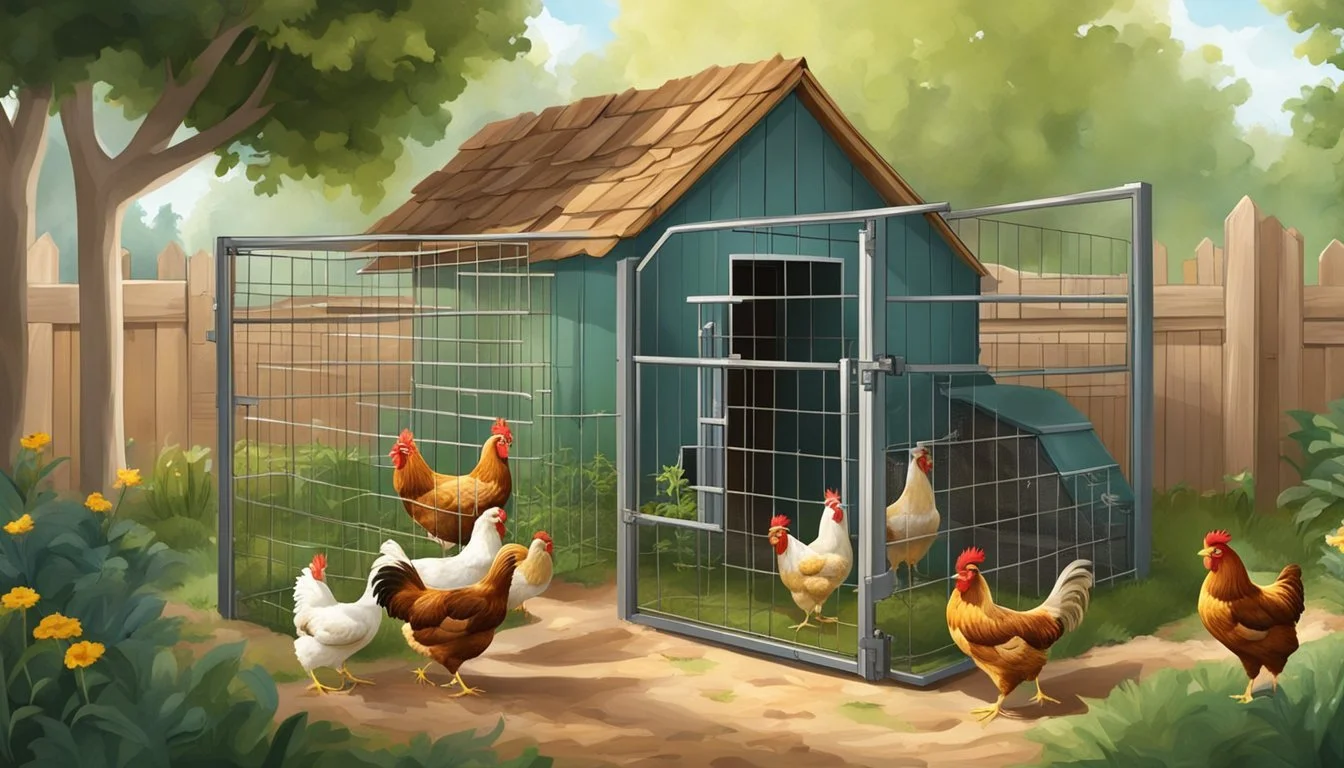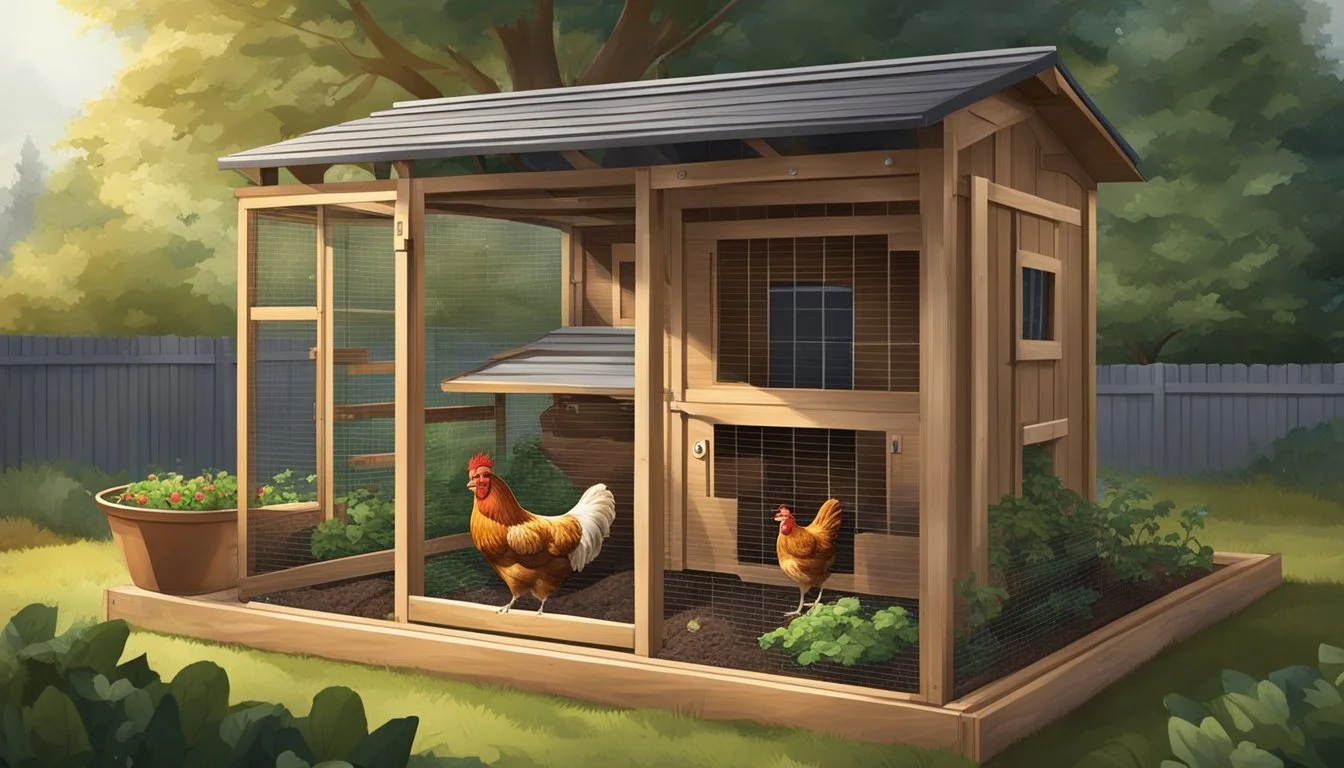Raising Backyard Chickens in Danbury, CT
The Essential Guide for Beginners
Raising backyard chickens has become a popular practice in many areas, offering enthusiasts the reward of fresh eggs, the joy of animal husbandry, and the sustainability of local food production. In Danbury, Connecticut, this trend is mirrored with certain regulations in place intended to balance urban living with the benefits of keeping chickens. Residents interested in pursuing this hobby must navigate local zoning laws to ensure their efforts align with the city's standards and ordinances.
Danbury's approach to allowing chickens within its jurisdiction is carefully regulated. Specific use regulations under the Zoning Regulations Section 4.A.5.f detail where and how residents can engage in farming, including the raising of chickens. While these activities are expressly permitted in the RA-80 Zoning District, those living outside these areas must review the restrictions and potentially seek a special exception to raise chickens on their property. Compliance with these rules is crucial for aspiring poultry keepers in Danbury to avoid any legal issues and maintain good community relationships.
Understanding local ordinances is just the first step for Danbury residents looking to start their own backyard chicken coops. Potential chicken owners are encouraged to reach out to city officials, such as the Office of Legislative Assistant, for the most current information and guidance on how to proceed legally. With proper adherence to local laws, Danbury citizens can enjoy the multifaceted benefits of raising backyard chickens while contributing positively to their local ecosystem.
Understanding Local Chicken Ordinances in Danbury
Raising backyard chickens in Danbury, Connecticut requires adherence to specific local ordinances. These regulations control where and how residents can keep chickens, as well as the number of chickens and roosters allowed.
Navigating City Hall and Regulations
Residents who wish to keep chickens should first contact the City of Danbury's Office of Legislative Assistant at (203) 797-4514 to understand the latest ordinances. It is crucial to obtain up-to-date information, as local chicken laws may have changed. Any updates or changes to the ordinances can affect how residents maintain their backyard flocks.
Zoning and Residential Chickens
Danbury's zoning regulations are particularly important for determining where chickens can be kept. Zoning Regulations Section 4.A.5.f allows farming, which includes keeping chickens, only in the RA-80 Zoning District as a special exception use. Residents must ensure their property falls within these parameters before setting up a chicken coop.
Number of Chickens and Roosters Allowed
While specific numbers may vary and should be verified with the city, the general rule is that backyard chicken flocks are maintained within reasonable limits to avoid unwholesome or offensive conditions as per City of Danbury Code of Ordinances. Roosters are often more strictly regulated due to noise concerns; hence, checking for any city-specific restrictions on roosters is essential.
Designing and Building a Secure Chicken Coop
When designing and building a chicken coop in Danbury, CT, residents must consider material durability, suitable size, predator protection, weather resilience, and cleanliness to ensure the health and safety of the chickens.
Choosing Appropriate Materials and Size
Selecting the right materials for a chicken coop is paramount. The coop should be constructed with sturdy wood—such as cedar or pine—for longevity and resistance to the elements. The size of the coop must accommodate the number of chickens raised; typically, 2-3 square feet per chicken inside the coop and 8-10 square feet per chicken in an outside run is recommended.
Foundation Material: Concrete slabs or paving stones can deter burrowing predators.
Walls: Use hardware cloth instead of chicken wire for better protection; all gaps should be sealed.
Roof: Sloped roofs prevent water accumulation and can be designed with overhangs to provide additional shelter.
Protecting Against Predators and Weather
Predators such as raccoons, foxes, and birds of prey are common in Danbury, making security a top priority. Proper construction methods can protect against these threats and adverse weather conditions.
Entry Points: Secure latches on doors and windows; equipped with locks that predators cannot easily open.
Fencing: Bury hardware cloth 12 inches deep around the perimeter to prevent digging.
Roofing: Use shingles or a metal roof to safeguard against rain and snow; consider proper insulation for winter months.
Maintaining Cleanliness to Prevent Disease
Cleanliness is crucial to prevent the spread of disease among chickens. Design the coop for easy cleaning to maintain a healthy environment.
Flooring: Sloped concrete or vinyl flooring encourages waste to slide off, making it easier to clean.
Ventilation: Sufficient airflow is needed to clear dust and dampness, reducing respiratory problems.
Waste Management: Implement a system for regular removal of waste; consider a droppings board beneath roosting areas for easy cleaning.
Caring for Your Chickens
When raising backyard chickens in Danbury, CT, owners must prioritize proper feeding, maintain health standards, and understand the daily requirements for upkeep and egg collection. Adherence to these practices ensures that the chickens are healthy and productive.
Feeding and Nutrition
Chickens require a balanced diet to thrive. They should be fed a commercial poultry feed that's formulated for their specific stage of life—starter, grower, or layer. Grain-based feeds provide them with the necessary nutrients, while kitchen scraps can be an occasional treat. It's essential to ensure that chickens have continuous access to clean, fresh water.
Starter Feed: High in protein, helps chicks grow
Layer Feed: Formulated for egg-laying hens, contains calcium
Health and Veterinary Care
Preventing disease is crucial in backyard poultry care. Regular check-ups with a veterinarian accustomed to dealing with livestock can aid in maintaining the flock's health. Flocks should be monitored for signs of distress or illness, such as changes in activity levels, eating habits, or egg production. Early detection and treatment can prevent the spread of disease.
Common Diseases: Avian influenza, fowl pox
Vaccinations: Consult a veterinarian for appropriate vaccinations
Daily Maintenance and Egg Collection
Daily maintenance includes cleaning the coop to prevent the build-up of manure, which should be composted adequately away from the living areas. Nest boxes should be checked daily for eggs, which are best collected in the morning. Gathering eggs frequently prevents them from becoming dirty or damaged and discourages hens from egg-eating habits.
Coop Cleaning: Change bedding regularly, remove waste
Egg Collection: Daily, ideally in the morning
The Benefits of Raising Chickens at Home
In Danbury, CT, homeowners have discovered that raising chickens provides a multitude of benefits ranging from fresh food sources to natural gardening solutions. Here's a closer look at these advantages:
Eggs, Meat and Organic Produce
Home-raised chickens supply fresh eggs daily, which are not only free from additives but are often nutritionally superior to store-bought ones. They can be considered organic if the chickens are fed organic feed and are raised following organic farming practices. In addition, these chickens can provide meat that is free-range, without the hormones and antibiotics found in commercially-raised poultry.
Fresh Eggs: Higher levels of vitamin A, E, and omega-3 fatty acids
Organic Meat: Healthier, free-range chickens yielding tastier and more ethical meat options
Sustainable Living: Reduces reliance on commercially-farmed products
Garden Fertilization with Chicken Manure
Chicken manure is an excellent organic fertilizer, rich in nitrogen, phosphorus, and potassium - essential elements for a thriving garden. Utilizing chicken manure contributes to a sustainable cycle of gardening and farming where waste is minimized and soil fertility is improved.
Natural Fertilizer: Enhances soil quality without chemical fertilizers
Waste Reduction: Manure from chickens reduces garden waste, contributing to a greener lifestyle
Gardening Efficiency: Improves plant growth and health significantly
Educational Opportunities for Families
Raising chickens in one's backyard can be a profoundly educational experience for both adults and children alike. Families learn about the responsibilities of animal care, the cycle of life, and sustainable farming practices. This knowledge helps in grounding individuals in natural processes and promoting awareness of food origins.
Animal Care: Teaches the principles of responsible and ethical animal husbandry
Life Sciences: Offers firsthand insight into the cycles of life, from hatching to laying
Sustainable Practices: Instills values of self-sufficiency and understanding of organic farming dynamics
Community and Legal Considerations
Raising chickens in the backyard is subject to various regulations in Danbury, CT. Key legal and community aspects impact both current and prospective chicken owners.
Participating in Local Farming Communities
Danbury residents interested in raising chickens can benefit from engaging with local farming communities. These groups often provide valuable insights into best practices and may offer assistance with understanding zoning constraints. Participation in these communities also fosters relationships, aiding compliance with both state and local guidelines.
Staying Updated on Legal Changes
Residents must stay informed about current and prospective amendments to Danbury's chicken raising laws. City Hall and the Office of the Legislative Assistant are reliable sources, providing updates about the legalities associated with raising chickens within city limits. They can be contacted at (203)797-4514. Proactive monitoring of Connecticut's state laws is equally critical, as these may influence local ordinances.
Balancing Urban Living with Livestock Needs
There is a delicate balance required when integrating livestock into urban areas such as Danbury. Residents must ensure that chicken coops meet specific zoning regulations to prevent conflict with neighbors. In Danbury, farming is permitted only in the RA-80 Zoning District, and even for personal use, regulations may restrict the ability to raise chickens based on land acreage and zoning classification. Prospective owners are advised to consult with zoning officers at Danbury City Hall prior to setting up a backyard chicken coop.
Additional Resources and Further Reading
When raising backyard chickens in Danbury, Connecticut, it's crucial to have access to the best resources. Whether you are trying to learn about flock size, proper care for chicks, building chicken coops, or managing chickens on farmland, reliable information can help ensure a successful endeavor.
Books and Online Guides
To gain in-depth knowledge about raising chickens, one should consider the following materials:
"Storey's Guide to Raising Chickens" by Gail Damerow: This book offers comprehensive details on care, breeds, and managing a healthy flock.
The Connecticut Agricultural Experiment Station: Provides online guides and publications on poultry farming relevant to state-specific conditions.
Local Workshops and Educational Programs
Individuals should explore hands-on learning opportunities. The City of Danbury and local agricultural extensions often hold educational programs:
University of Connecticut Extension: Offers workshops for prospective poultry farmers on how to start and maintain a healthy flock.
Danbury Agricultural Fair: Occurs annually, providing attendees with the opportunity to learn from experienced chicken owners and explore various aspects of poultry care.
Supportive Online Communities and Forums
Interactive platforms can be invaluable for ongoing support:
BackYard Chickens Community: A forum where Danbury residents can connect with other chicken enthusiasts, exchange advice on flock size and coop construction, and seek guidance on Connecticut-specific poultry regulations.
Danbury Poultry Fanciers Association: Local group meetings can be a source of information and support for both novice and experienced chicken keepers within the area.
These resources can equip enthusiasts with the necessary knowledge and support to raise a healthy backyard flock while complying with Danbury's regulations.








